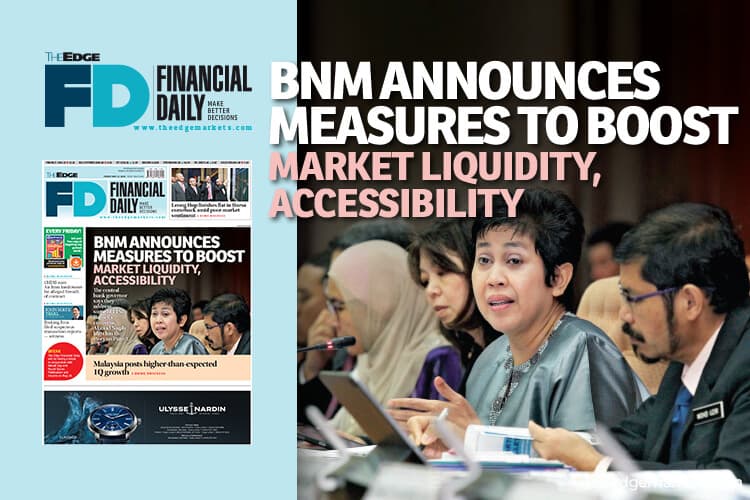
This article first appeared in The Edge Financial Daily on May 17, 2019
KUALA LUMPUR: Bank Negara Malaysia (BNM) yesterday announced several initiatives aimed at enhancing market efficiency, liquidity and accessibility in both the bond and foreign exchange (forex) markets, following news last month that FTSE Russell was considering downgrading Malaysia’s market accessibility, which could result in exclusion from its World Government Bond Index (WGBI).
“The series of measures we have announced is a culmination of productive talks we have had with the stakeholders, including the index providers. We do engage with the index providers on a yearly basis.
“We tried to announce it earlier when we released our annual report [in March] but decided to do it in the first-quarter announcement, so it coincides with the previous news regarding the index,” BNM governor Datuk Nor Shamsiah Mohd Yunus told a press conference when announcing the country’s first-quarter (1Q) growth, which came in above forecasts, at 4.5%.
Two measures were announced to deepen the bond market: one is by enhancing the repo (repurchase) facility to allow greater flexibility, which includes lengthening the repo tenure beyond one year; the second is the development of an effective hedging platform for investors, which will further enhance the delivery mechanisms for Malaysian Government Securities (MGS) futures settlement.
“The initiatives will improve market accessibility and this is one of the criteria that FTSE Russell had mentioned that resulted in the Malaysian bond market being put under review. We will continue our discussion with them,” she said.
Nor Shamsiah also said investor sentiment on bonds had improved in 1Q, following the US Federal Reserve’s signal for a pause in its interest rate hikes for 2019, and increasing optimism over global trade negotiations, which led to inflows into regional bond markets, including Malaysia.
The portfolio investment account registered a net inflow of RM2.1 billion, accounted by non-resident inflows amounting to RM30.5 billion as Malaysian bonds remained attractive, although sentiment was dampened at the start of 2Q.
“In April, we observed a reversal of 1Q inflows from the government bond market amounting to RM7.1 billion, mainly attributed to non-resident financial instituions and short-term investors.
“This is in part due to negative headlines such as news on the potential exclusion of Malaysian bonds from the WBGI and Norway’s plan to drop emerging market bonds from its benchmark, which have affected market sentiment,” she said.
No significant impact from Norway fund’s pullout
However, she said the decision by Norway’s sovereign wealth fund to cut its exposure to emerging market (EM) governments and corporate bonds does not have a significant impact on the domestic bond market.
This is because the market has a deep pool of domestic and institutional investors, she said. She also pointed out that during previous periods of significant outflows, Malaysian bond yields did not move as much as that of its regional peers.
“If you look at the bond yields today, despite the outflows, the yields are back to what it was at the beginning of the year,” she said.
Nor Shamsiah added that while Norges Bank had announced they would remove EM countries from their benchmark index, this does not mean they cannot buy selectively or is unable to buy Malaysian bonds.
“They can still buy Malaysian bonds but it will not be part of their performance index. It’s off the benchmark but still remains as an investable investment,” she said.
Opens dynamic hedging to trust banks, global custodians
As to initiatives to enhance the forex market, the central bank said, effective immediately, that the dynamic hedging programme will be extended to trust banks and global custodians, to provide greater access.
“Dynamic hedging is similar to hedging on the non-deliverable forward (NDF) market, just that it is in the domestic market, and there’s more transparency compared with the offshore NDF market,” she said.
And to increase the flexibility for dynamic hedging participants, registered institutional investors can enter into forward contracts to buy ringgit beyond the current threshold of 25% of underlying assets upon approval by BNM.
The central bank is also simplifying the forex transaction and documentation process, and extending the capacity to provide ringgit liquidity beyond the close of the local market at 6pm. BNM’s plans to boost the onshore market’s liquidity and accessibility are expected to allay concerns by foreign investors over the possible exclusion of Malaysian bonds from the WGBI, which has weighed on the ringgit’s performance over the last one month, according to FXTM market analyst Han Tan.
At press time, the ringgit had strengthened 0.22% to 4.1645 against the US dollar.